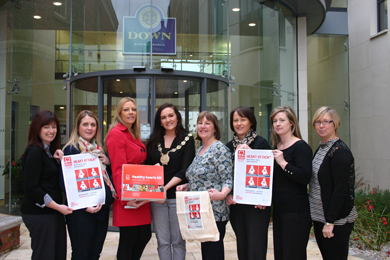THE South Eastern Health and Social Care Trust and Down District Council is promoting a Heart Attack Awareness Campaign.
Question: How long do you think people wait before calling 999 if they thought they were having a heart attack?
Answer: Only one in ten people (14%) call 999 within an hour of experiencing the symptoms of a heart attack.
This is one of a number of startling statistics from a recent audit as British Heart Foundation (BHF) Northern Ireland joins forces with the South Eastern Health and Social Care Trust, Northern Ireland Ambulance Service and Down District Council to promote a heart attack awareness campaign in the Downpatrick and Lisburn areas.
Worryingly, the audit outlines that only 12% of people admitted to the Coronary Care Units with a heart attack during the audit period stated their first call for assistance was 999 with over 50% calling or presenting to their local A&E.
[caption id="attachment_45379" align="alignleft" width="390"] Promoting the heart attack awareness campaign outside the Down Civic Centre are Heather Holland, Co Down Rural Community Network (CDRCN), Daniella Quinn CDRCN, Stephanie Leckey British Heart Foundation N. Ireland, Councillor Maria McCarthy, Down District Council Chairman,
Promoting the heart attack awareness campaign outside the Down Civic Centre are Heather Holland, Co Down Rural Community Network (CDRCN), Daniella Quinn CDRCN, Stephanie Leckey British Heart Foundation N. Ireland, Councillor Maria McCarthy, Down District Council Chairman,Elaine Hardy, South Eastern HSC Trust, Paula Nixon CDRCN, Lise Curran CDRCN, and Jenny Laverty, Flying Horse Ward Community Forum.[/caption]
Speaking about the importance of the heart attack awareness campaign, Councillor Maria McCarthy, Down District Council Chairperson, said: “Each year in Northern Ireland around 4,000 people’s lives are dramatically changed by heart attacks, and alarmingly, a significant number of people are still waiting too long to call 999 when symptoms of a heart attack arise.
“There is a greater need for more people to be aware of the signs and symptoms of a heart attack and to take them seriously, as this may lead to cardiac arrest.
“This campaign will help highlight heart attack awareness and educate local people to take the correct prompt action.”
BHF Northern Ireland’s Area Development Manager, Stephanie Leckey, said: “The audit shows that people still do not understand why it is so vital to call 999 at the very first sign of a possible heart attack. Every second counts when you are having a heart attack, and calling the emergency services immediately means you are much more likely to survive.
“The lives of too many families are shattered by heart attacks… we hope to help change that with this campaign.”
Local people are being urged to think quick and act fast by calling 999 if they have any of the following symptoms:
* Pain or discomfort in the chest that doesn’t go away
* The pain may spread to the left or right arm, neck or jaw
* Feeling sick or being sick
* Short of breath
* Sweating although the skin may feel cold to the touch
* Reduced level of consciousness or unconsciousness
A Heart Attack Awareness Campaign is being carried out both Downpatrick and Lisburn areas over the next six months. The campaign includes bus advertisements, posters in public places such as GP surgeries, leisure centres, etc., bags for life and leaflets.
For more information on heart attack sign and symptoms and what to do visit:
www.bhf.org.uk or www.2minutes.org.uk
• The Heart Attack Awareness audit was carried out by the South Eastern Health & Social Care Trust. The data was collected on a total of 56 patients who were admitted with a heart attack between May and August 2013 to Lagan Valley and Downpatrick Hospitals by the South Eastern Health & Social Care Trust on behalf of BHF Northern Ireland.
• Coronary heart disease is the Northern Ireland’s single biggest killer. For over 50 years we’ve pioneered research that’s transformed the lives of people living with heart and circulatory conditions. Our work has been central to the discoveries of vital treatments that are changing the fight against heart disease. But so many people still need our help. From babies born with life-threatening heart problems to the many Mums, Dads and Grandparents who survive a heart attack and endure the daily battles of heart failure. Join our fight for every heartbeat in Northern Ireland. Every pound raised, minute of your time and donation to our shops will help make a difference to people’s lives.
Important Heart Attack Information
* A heart attack occurs when one of the coronary arteries supplying blood to the heart muscle becomes blocked by a blood clot. Trained ambulance staff and appropriately trained first aid responders can deal with this life-threatening emergency, so if you think you are having a heart attack, don’t delay. The quicker you call 999 for an ambulance, the better your chance of survival.
There are two reasons to call 999 immediately:
* If you are having a heart attack, you could develop a life-threatening heart rhythm, which may lead to a cardiac arrest. This is when you lose consciousness; you stop breathing normally and your heart stops pumping blood round the body. This can be fatal without immediate cardio-pulmonary resuscitation (CPR) and / or defibrillation.
* So you can get help and treatment immediately. This will help to restore the blood flow to the damaged part of the heart muscle again as quickly as possible and limit the amount of permanent damage to your heart.
There is evidence that the delay in seeking treatment for a heart attack directly correlates with death rates. Those who get treatment within 1-2 hours of the onset of symptoms are twice as likely to survive as those who get treatment within 4-6 hours.
]]>























